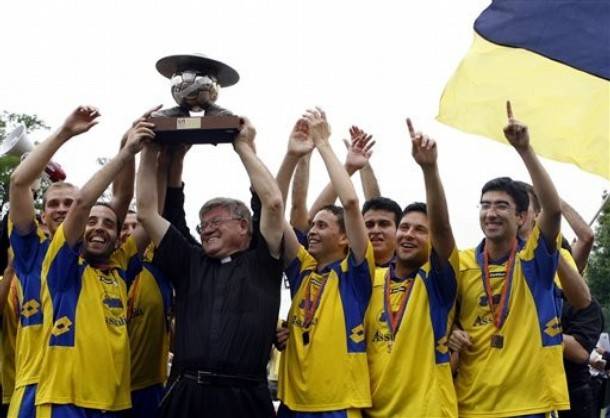Priests on the Ball: They Pray, They Shoot, They Score
Italian soccer fans are no doubt still reeling from this week’s significant Euro Cup loss (not in the least mitigated by a subsequent tie with Romania),
suffering it like a death and feeling as disconsolate and “shell-shocked” as the Azzurri themselves. The term “Orange Crush”, as the commentators have dubbed the Dutch national team, may very well put Italians off orange soda for the next year. And although it seems there is no silver lining to this cloud, no turning back from such a humiliating defeat, perhaps Italians could look to a different sort of soccer tournament—one in which winning and losing are not essential to the game. Impossible you say, but at the heart of the world’s smallest independent state is a soccer competition that brings together players from more than 70 countries all over the world, with a mind toward playing the sport ethically and gracefully.
Annually the Vatican hosts priests and seminarians drawn from Rome’s seminary colleges. Divided into 18 teams, they compete for athletic glory in what has been called the “Clericus Cup”. The play-off held at St. Peter’s Oratory from November to May represents nations as diverse as Malta, Zimbabwe, Ukraine and England. The clerical contenders bring a couple of twists to the sport, namely a strict adherence to fair-play and mandatory collective prayer before each hour-long match (it is unknown as to what teams pray for—it could be world peace, or the strength to whoop Zimbabwe in the next round).
The tournament was founded little over a year ago by Cardinal Tarcisio Bertone, the Pope’s Secretary of State and avid Juventus fan, who in his spare time also served as a soccer commentator. Bertone acted in the wake of last year’s Serie A scandals (a slew of incidents that included accusations of match-rigging), when he thought it opportune to restore faith in Italian soccer and bring morality back into the sport. Along with following the rules, many of the priestly players have stressed, more in theory than in practice, the importance of “knowing how to lose”.
Die-hard fans may be heartened—and amused—to hear that however much the Clericus Cup preaches good behavior, the priests are no saints. This year players were told to watch their game after an unprecedented three red cards were handed out (as opposed to the tournament-specific “blue cards” that force a player to take a 5-minute timeout “to reflect on his sins”) and one enraged priest threw his shirt at a referee, yelling invectives. Residents in the vicinity of St.Peter’s also filed several complaints for all the noise generated by the tournament. Each nation had its own method for creating raucous sideline cheers, African teams using reggae music, Mexican teams drums, American teams fight songs and loud choral singing, and Italians megaphones and chants in Latin. Felice Alborghetti, one of the cup’s organizers, told The Scotsman, “The complaints were such that we had to tell the fans not to bring any sort of musical instruments to future games. It just got a bit excessive.”
It’s a relief to hear that our religious messengers are not above short fuses and a spirit of healthy competition. With Pope Benedict, a self-proclaimed Bayern-Munich fan, having formally endorsed the tournament and organizers expressing hopes to form their own Vatican team, maybe we can expect to have a live televised Clericus Cup next year—with all the hysteria and hoopla appropriate to the sport. May our prayers be answered, because it would be less heartbreaking than watching this season’s Euro Cup.


































i-Italy
Facebook
Google+
This work may not be reproduced, in whole or in part, without prior written permission.
Questo lavoro non può essere riprodotto, in tutto o in parte, senza permesso scritto.